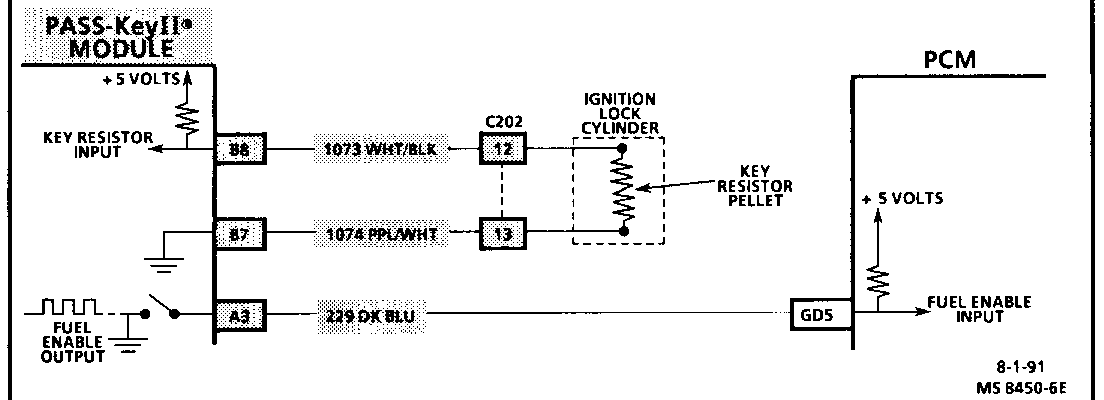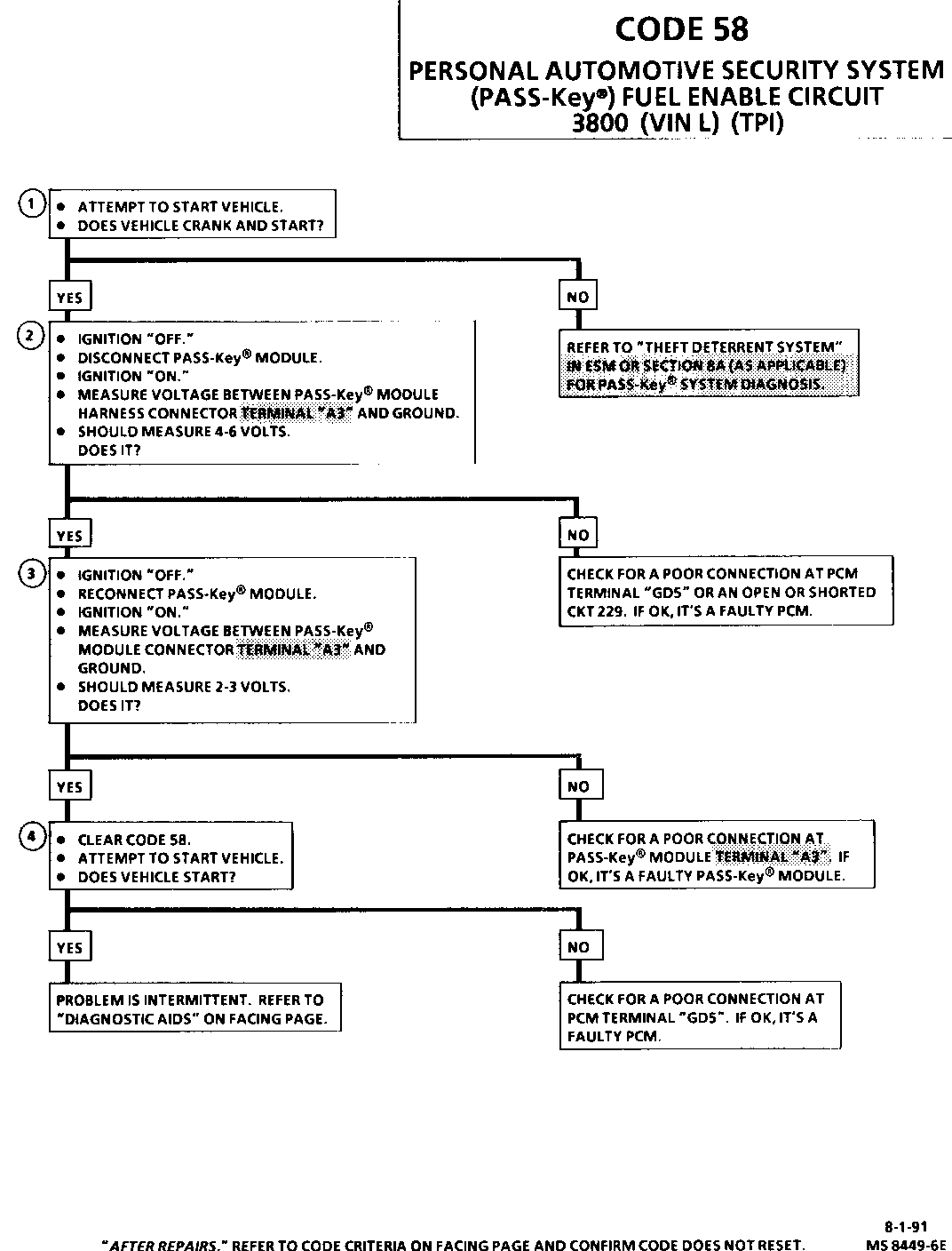SERVICE MANUAL UPDATE SEC. 6E3 REVISED CODE 58 CHART

SUBJECT: REVISED CODE 58 CHART AND FACING PAGES
MODELS/YEARS: 1991-92 NINETY EIGHT AND 1992 EIGHTY EIGHT WITH 3800 (VIN L) ENGINE
This bulletin updates the Code 58 Chart and Facing Page in Section 6E3 "Driveability And Emissions" for 1992 Eighty-Eight models equipped with the 3800 (VIN L) engine. The Code 58 Chart for these vehicles has been revised for use with the new PASS-KEY II system.
Also, several circuit numbers and wire colors on the Code 58 facing page in Section 6E3 "Driveability And Emissions" for the 1991 and 1992 Ninety-Eight models are incorrect. To correct, make the following changes to the circuit diagram on the pages shown below:
Circuit 922 BRN should be 1073 WHT/BLK Circuit 921 YEL should be 1074 PPL/WHT
Year Service Manual Page Number ------------------- --------------- 1991 6E3-A-86 1992 6E3-A-94 (VIN L) 1992 6E3-A-100 (VIN 1)
CODE 58 PERSONAL AUTOMOTIVE SECURITY SYSTEM (PASS-Key) FUEL ENABLE CIRCUIT 3800 (VIN L) (TPI) ------------------------------------------------------------------- Circuit Description: --------------------- When the ignition is turned "ON," the PASS-Key decoder module "reads" the key resistor pellet. If the proper resistance is recognized by the PASS-Key decoder module, it sends a PWM fuel enable signal via CKT 229 to the PCM. The PCM looks for this signal during crank and allows fuel delivery by enabling the injectors when the signal is recognized. If the fuel enable signal is lost while the engine is running, the PCM will store Code 58 and the vehicle will run normally. As long as Code 58 is stored, the PCM will ignore any absence of the fuel enable signal and the vehicle will restart and run as long as the problem is isolated to the fuel enable circuit only. See "Theft Deterrent Systems, PASS-Key in SECTION 8A or Electrical Systems Manual (as applicable) for a complete description and diagnostic procedures. Code 58 does not illuminate the "Service Engine Soon" light.
Test Description: Number(s) below refer to circled number(s) on the diagnostic chart.
1. If vehicle will not crank with Code 58 stored, the problem affects the entire PASS-Key system and is not isolated to the fuel enable circuit. Refer to "Theft Deterrent Systems Diagnosis," in SECTION 8A or Electrical Systems Manual (as applicable) when diagnosing a Code 58 accompanied by a no-crank.
2. The PCM supplies 5 volts to CKT 229 which the PASS-Key decoder module pulses to ground when the correct key resistance is recognized. This test ensures that the PCM is supplying 5 volts and CKT 229 is not open or shorted to ground.
3. Checks the PWM signal from the PASS-Key module. Since the 5 volts supplied by the PCM is being pulsed to ground, voltage on CKT 229 should measure around 2.5 volts.
4. Checks for a faulty PCM or intermittent condition by clearing Code 58. Since the PCM ignores the absence of a fuel enable signal only when Code 58 is stored, the vehicle should not start if the problem is present and Code 58 has been cleared.
Diagnostic Aids:
An intermittent Code 58 and/or a possible no-start can be caused by the following:
o Loss of Power or Ground to PASS Decoder Module - A loose ground or poor ignition or battery connection could cause an intermittent loss of the PASS-Key fuel enable signal and Code 58 to be set.
o Dirty, Damaged, or Loose Connections or Damaged Harness - Check for any damage to the harness which could cause an intermittent open or short to ground, backed out terminals at the PCM and PASS-Key decoder module connectors, broken locks, improperly formed or damaged terminals.


General Motors bulletins are intended for use by professional technicians, not a "do-it-yourselfer". They are written to inform those technicians of conditions that may occur on some vehicles, or to provide information that could assist in the proper service of a vehicle. Properly trained technicians have the equipment, tools, safety instructions and know-how to do a job properly and safely. If a condition is described, do not assume that the bulletin applies to your vehicle, or that your vehicle will have that condition. See a General Motors dealer servicing your brand of General Motors vehicle for information on whether your vehicle may benefit from the information.
